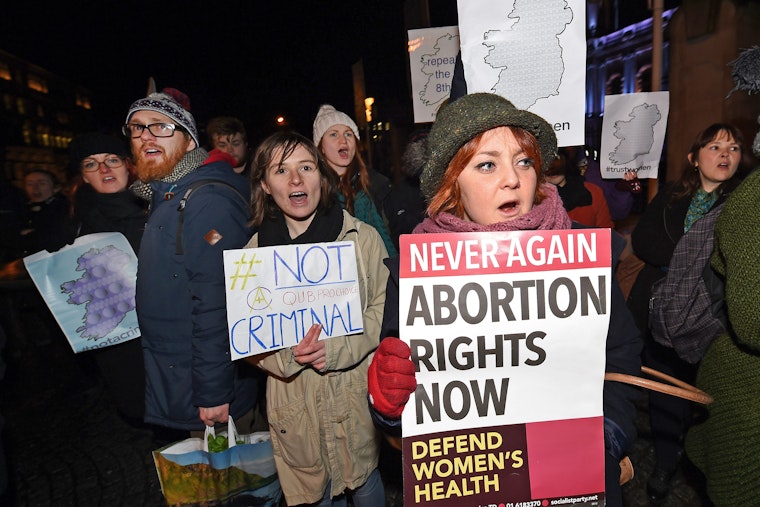Women Speak Up Against an Archaic Abortion Law in Northern Ireland
By Kellie O’Dowd

In June, I joined 199 other women in Northern Ireland in signing an open letter admitting to taking the medical abortion pill or buying it for someone else, crimes that carry a maximum sentence of life in prison under Northern Ireland’s Offences Against the Persons Act, passed in 1861. We wanted to highlight the ridiculousness of the law by challenging the authorities to enforce it.
So far, not one of us has been investigated. Meanwhile, earlier this month a 21-year-old woman appeared in a Belfast court for allegedly acquiring and then taking the pill in order to cause an abortion. She is the first woman in almost 40 years to be charged under the act, which has been on the books since Queen Victoria was on the throne.
Unlike me and my fellow signatories, the woman does not appear to be part of any advocacy group and, therefore, does not have access to the strong support network we do. It begs the question: Why has she been singled out?
More importantly, why should any woman face the threat of prosecution for accessing reproductive health care? The abortion pill in question—actually two medicines called mifepristone and misoprostol—can be used in the first nine weeks of pregnancy. In Europe, more than 1.5 million women have used the drugs, which have been on the World Health Organization’s list of essential medicines since 2005 and are deemed safer than antibiotics.
Sadly, Northern Ireland stands out for its degrading, barbaric treatment of women. The United Kingdom’s Abortion Act 1967, which allows abortions in certain situations, does not apply here. Under our 1861 law, women cannot obtain an abortion even in cases of rape, incest, or fatal fetal abnormalities.
In November, in a case filed by the Northern Ireland Human Rights Commission, a Belfast judge found that the 1861 law is incompatible with the European Convention on Human Rights. But he left it up to our legislators to make things right. So far, they have refused to do so—although their counterparts in Sierra Leone recently voted to change a similar law to make way for safe abortion legislation in that country.
All women, no matter where they live, should be able to access free, safe, legal abortion and be cared for close to home by medical practitioners. Instead, current laws leave women with no alternative but to take matters into their own hands to end a crisis pregnancy. Every year, approximately 1,000 women from the North and 4,000 women from the Republic (which has its own draconian law) travel to England and beyond to access abortion at a cost ranging from £600 to £2,000 ($850 to $2,800 USD). The medical abortion pill can be purchased on the internet and taken at home for around £50 ($70).
For many women, the decision to take the pill is a no-brainer. They don’t have to travel or lie to family, friends, colleagues, and employers about why they are traveling. And they don’t have to come up with a lot of cash. Unfortunately, for women in Northern Ireland, that option is against a law that, however antiquated, can still be enforced, as we saw in Belfast.
Soon after the unnamed woman’s arrest, pro-choice groups organized a protest rally outside Belfast City Hall calling for the case against her to be dismissed immediately. Solidarity protests were held in Dublin, London, Cork, Galway, and Berlin.
The hypocrisy and unworkability of the 1861 law are shameful. The woman charged is not a criminal. I am not a criminal. The others who signed the letter are not criminals. It is time for our legislators to trust women and to enact decent reproductive health care legislation throughout Ireland.
Alliance for Choice Belfast is a grantee of the Open Society Foundations.
Correction (February 1, 2016): This post was updated to note that Sierra Leone has not yet repealed a law on abortion; the proposed legislation can only be enacted with presidential approval.
Kellie O’Dowd is chairperson at the Alliance for Choice Belfast.


